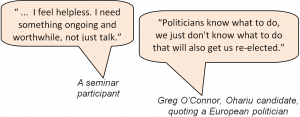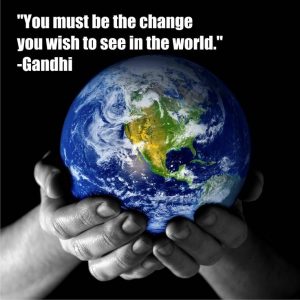Climate Change Seminar –
a community information-sharing forum
Site updated 24 May 2017
- Our Seminar was held on Wednesday 10 May 2017. This site has now been updated to include key ideas raised during the evening. A further site update is planned by 7 June.
- If you would like to be notified when this site is next updated, please send an email to office@slw.org.nz with “Climate Change” in the subject line.
_____________________
The Seminar covered:
-
- Why do we care? Mrs Yvonne Curtis, MSc Chemistry, 30 years member of the NZ Futures Trust Board, past Moderator of the Wellington Presbytery of the Presbyterian Church, and active in groups addressing interfaith issues.
[NEW] CLICK HERE for Yvonne’s presentation notes.
- Why do we care? Mrs Yvonne Curtis, MSc Chemistry, 30 years member of the NZ Futures Trust Board, past Moderator of the Wellington Presbytery of the Presbyterian Church, and active in groups addressing interfaith issues.
CLICK HERE for audio of Yvonne’s presentation.
- Climate disruption: an existential threat. Dr George Preddey, retired physicist, former atmospheric physicist/futurist/disaster manager, peer-reviewer of publications on perceived existential threats including ozone depletion, nuclear war, climate disruption, and marathon runner.
[NEW] CLICK HERE for George’s presentation text.
CLICK HERE for audio of George’s presentation.
- Climate change and health: symptoms too serious to ignore. Dr Russell Tregonning, semi retired orthopaedic surgeon, executive member of OraTaiao: The NZ Climate & Health Council, with over 500 NZ health professionals concerned about the health dangers of climate change, and cyclist.
[NEW] CLICK HERE for Russell’s presentation images.
CLICK HERE for audio of Russell’s presentation.
- Opportunity for questions and suggestions for local actions: Open forum
 [NEW] CLICK HERE for comments and opinions gathered from the open forum.
[NEW] CLICK HERE for comments and opinions gathered from the open forum.
Some references for further information:
Website

- Zero Carbon Act Link: HERECalls for support for the following petition:
To the next New Zealand Parliament,
Climate change is bigger than politics. We need political parties to work together and look beyond election cycles.
We need you to take meaningful action on climate change by passing a new law to establish a climate commission, set a long term goal, and give Aotearoa New Zealand a plan to get there: the Zero Carbon Act.
Books
- Emeritus Professor James R Flynn (October 2016) No Place to Hide: Climate Change, a Short Introduction for New Zealanders. Potton & Burton.
Millions of educated people all over the world feel powerless in the face of climate change and its consequences, partially because the literature on the environment is so vast it is difficult to know where to begin. This short book is intended to make their search for truth manageable. It allows the reader to isolate the crucial issues and form his or her own opinion, and while it addresses a world audience it has a special reference to New Zealand.
For a 6 page Synopsis of Prof Flynn’s book by Dr Preddey, click _No place to hide – Jim Flynn (2016)
- Professor J Boston (Feb 2017) Safeguarding the Future: Governing in an Uncertain World. Bridget Williams Books.
In an era of populist politics, Brexit, Donald Trump, 24-hour news cycles and perpetual election campaigning, how do we govern well for the future? How do we take the long view, ensuring that present-day policy decisions reflect the needs and safeguard the interests of future generations? In this timely BWB Text, acclaimed policy scholar Jonathan Boston sets out what ‘anticipatory governance’ might look like in New Zealand. Confronted with a world becoming more uncertain by the day, this book is essential reading for anyone questioning how democratic societies can tackle the unprecedented challenges ahead.
- Max Harris (April 2017) The New Zealand Project Bridget Williams Books
By any measure, New Zealand must confront monumental issues in the years ahead. From the future of work to climate change, wealth inequality to new populism – these challenges are complex and even unprecedented. Yet why does New Zealand’s political discussion seem so diminished, and our political imagination unequal to the enormity of these issues? And why is this gulf particularly apparent to young New Zealanders?
These questions sit at the centre of Max Harris’s ‘New Zealand project’. This book represents, from the perspective of a brilliant young New Zealander, a vision for confronting the challenges ahead. Unashamedly idealistic, The New Zealand Project arrives at a time of global upheaval that demands new conversations about our shared future.
- Bishop Richard Randerson (June 2015) Slipping the Moorings. Matai House
Richard Randerson’s life and ministry have spanned a period of profound change in New Zealand and the wider world. During this time the Church has sometimes led, but often lagged, on a bewildering array of issues: marriage of divorcees, ordination of women, anti-nuclear and anti-apartheid protests, same-sex relationships, abortion, poverty, inequality in economics and justice, treaty settlements, church constitutional change, prayer book rewriting, contemporary theology, inter-faith relations, genetic modification, civil marriage, same gender marriage and the priestly vocations of gays and lesbians. Richard has been in the thick of many of these defining battles down through the decades. His memoir is not just the story of one man’s work in Church and Society through decades of turbulent change. It is a font of wisdom and practical advice for those seeking God’s help today on society’s even greater challenges.
- [NEW] Bronwyn Hayward (2012) Children, Citizenship and Environment – Nuturing a democratic imagination in a changing world. Routledge, Taylor & Francis Group, London and New York.
Children growing up today are confronted by four difficult and intersecting challenges: dangerous environmental change, weakening democracies, growing social inequality, and a global economy marked by unprecedented youth unemployment and unsustainable resource extraction. Yet on streets everywhere, there is also a strong, youthful energy for change.
This book sets out an inspiring new agenda for citizenship and environmental education which reflects the responsibility and opportunities facing educators, researchers, parents and community groups to support young citizens as they learn to ‘make a difference’ on the issues that concern them.
Website articles
- A brief introduction to Climate Change and Peak Oil for New Zealanders
Sean Millar and Adrienne Puckey (2008)
Link: HERE (scroll down to the title)
(Note other useful papers on this site.)
- Foresight as a gravitational force Dr Robert Hickson: Ariadne blog (21 March 2017)
Link: HERE
It’s vital that not only should government be taking foresight, or anticipatory governance, more seriously, so should everyone else. If the public aren’t demanding better anticipation then government is less likely to do it, and more likely to ignore foresight activities. Institutional structures are important, but it involves more than a “build it and they will come” mindset.
- Stop Thinking Explaining Science Will Fix Things Tim Requarth (April 19 2017)
Link: HERE
Communication that appeals to values, not just intellect, research shows, can be far more effective.
- Thinking about machines that “Think” Dr Robert Hickson: Ariadne blog (19 Jan 2017)
Link: HERE
Considers what types of problems are most and least suitable for Artificial intellegence solutions.
- [NEW] Globe-NZ: MPs collaborate across party lines in response to climate change NZ Parliament website (Updated 19 April 2017)
Link: HERE
Last year, 2016, New Zealand signed up to the Paris Agreement, committing us to a global effort to limit the impacts of climate change. In an effort to meet those obligations, a group of 35 MPs from across Parliament commissioned a report into long-term low emission pathways, which is now available. On 13 April the House held a special debate on this report. This page provides links to the report, the full Parliamentary debate on YouTube, and the Hansard transcript of the debate.
++++++++++++++++++


